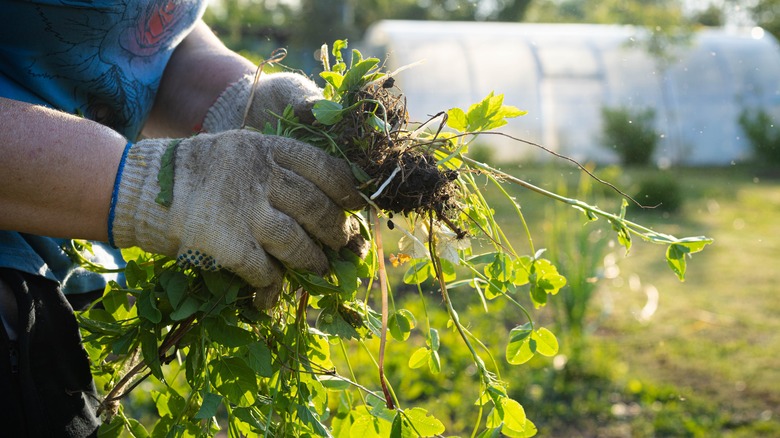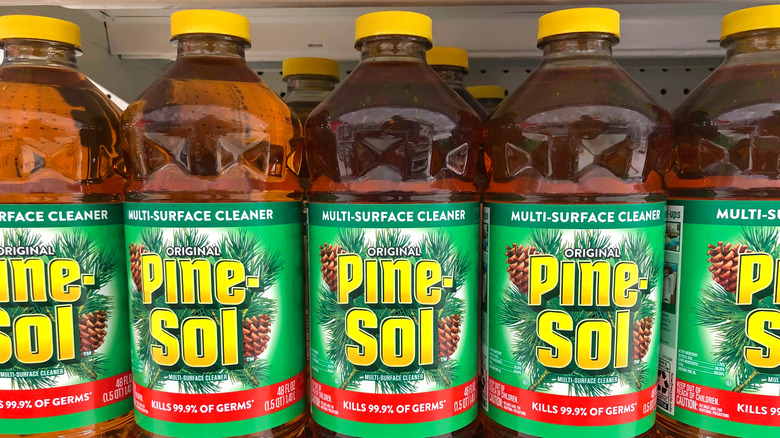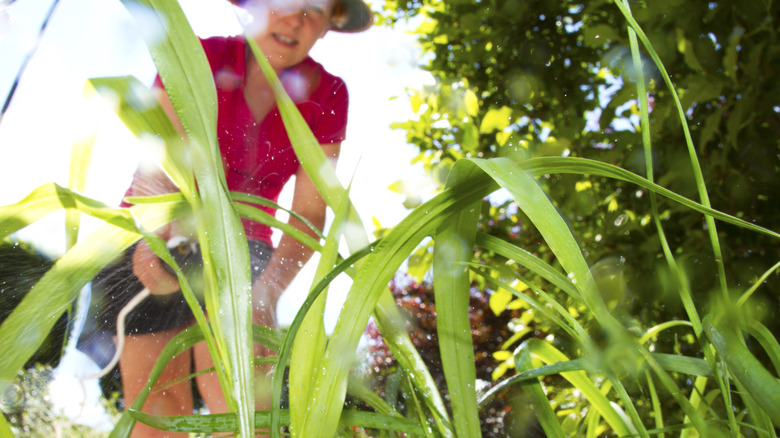This Cleaning Staple Is The Key To Keeping Weeds Out Of Your Yard
Weeds are the bane of many gardeners' existence, often requiring constant attention and effort to keep them at bay. Traditional methods like hand-pulling weeds and chemical herbicides can be time consuming, expensive, and sometimes harmful to the environment. Unconventional solutions, like sugar — the game-changing hack that kills weeds like no other — can work on some plants; however, using salt to kill weeds can be a critical mistake. Fortunately, there is a simple, cost-effective solution that might surprise you: mixing Pine Sol with dish soap and water.
Imagine being able to tackle those stubborn weeds with ingredients you already have at home without the need for harsh chemicals or strenuous labor. This method utilizes common household items to create a powerful weed deterrent. It's a blend that can transform your yard maintenance routine, making it easier and more environmentally friendly. This simple mixture can penetrate the weeds' defenses, dehydrating and killing them from the inside out.
Intrigued by how such a straightforward solution can achieve such effective results? This mix is grounded in basic principles of chemistry and plant biology, ensuring that it is both practical and scientifically sound. By harnessing this combination, you can create a potent weed killer that rivals commercial options in both effectiveness and safety.
The magic mix: Pine-Sol, dish soap, and water
Pine-Sol, a popular household cleaner known for its disinfecting properties, also has components that can effectively tackle weeds. When combined with dish soap and water, this mixture becomes a potent solution that can penetrate and kill unwanted plants. Here's how it works.
The Pine-Sol sticks to the protective outer layer of the weeds, which leads to dehydration and eventually kills them. The dish soap serves as a surfactant, helping the Pine-Sol adhere to the weed's leaves more effectively, ensuring maximum absorption. Water, the third ingredient, dilutes the mixture just enough to be safe for use in your yard while still maintaining the product's weed-killing potency.
To prepare this weed control solution, mix 1 tablespoon of Pine-Sol, 1 tablespoon of dish soap, and 1 cup of water in a spray bottle. Shake well to ensure the ingredients are thoroughly combined. When applying the mixture, spray it directly onto the weeds, making sure to cover the leaves and stems. This method works best on a sunny day, as the heat can accelerate the drying process and enhance the solution's effectiveness. Regular application can help maintain a weed-free yard without the hassle of constant weeding.
Benefits and tips for using the Pine-Sol mixture
Using Pine-Sol with dish soap and water as a weed control method offers several benefits. First and foremost, it is a cost-effective solution. Both Pine-Sol and dish soap are affordable and commonly found in most households, making this method accessible to everyone. Additionally, this mixture is easy to prepare and apply, saving you time and effort compared to traditional weeding or using expensive commercial herbicides.
Another significant benefit is the environmental impact. Unlike many chemical herbicides, this Pine-Sol mixture does not introduce harmful chemicals into your garden. It is a more eco-friendly option that minimizes the risk of contaminating soil and groundwater. Moreover, it reduces the exposure of pets and children to toxic substances, providing a safer yard for your family to enjoy.
To maximize the effectiveness of this weed control method, consider a few practical tips. First, apply the solution during the hottest part of the day to enhance its desiccating properties. Repeat applications every few days until the weeds are entirely eradicated. Be cautious when spraying near desirable plants, as the mixture can also harm them. Use a targeted approach to ensure that only the weeds are affected. Additionally, regular maintenance and reapplication may be necessary to keep new weeds from emerging. Remember, however, that not all weeds are bad, and there may be some that could be advantageous to your garden.


